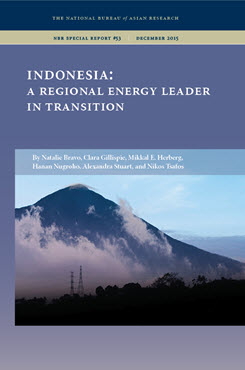Redefining Indonesia's Energy Security
Efforts to Adopt Cleaner, More Sustainable Energy Strategies
This essay examines Indonesia’s growing desire to integrate emerging concerns, such as environmental considerations, into its energy security strategies and describes how the country’s renewable energy potential can play a greater role in this discussion.
EXECUTIVE SUMMARY
This essay examines Indonesia’s growing desire to integrate emerging concerns, such as environmental considerations, into its energy security strategies and describes how the country’s renewable energy potential can play a greater role in this discussion.
MAIN ARGUMENT
Indonesia is currently confronting a high degree of energy insecurity. Yet despite its diverse and large potential for renewable energy, Indonesia is engaging only a very small share of these domestically available resources—totaling less than 5% of the energy mix. The government is aware of the country’s energy insecurity and is taking more serious actions to overcome the problem. Yet more will need to be done if Indonesia is to achieve its goal of making renewables 23% of its energy mix by 2025. Such new efforts must also address concerns about coordination among local and national government bodies, the rapidly changing legal and regulatory environment, the high upfront costs associated with renewable energy development, and a complex geography that can complicate infrastructure development. Redoubled efforts to develop renewable energy not only would strengthen Indonesia’s energy security but also could create attractive business opportunities for both domestic and foreign parties.
POLICY IMPLICATIONS
- Harnessing renewable energy is among the top priorities of the current middle-term development plan led by President Joko “Jokowi” Widodo, and potential sources of renewable energy range from geothermal, hydro, solar, and tidal energy to several types of bioenergy.
- In many cases, sources of renewable energy are found in islands far away from demand centers, which can complicate efforts to develop these resources. Transportation costs between islands are expensive, and infrastructure connecting the vast archipelago is still very limited.
- Addressing these challenges will require greater attention from policymakers, industry, and NGO partners.
- Securing social license to operate—that is, taking into account local culture and land ownership concerns in the development process—is a further challenge for Indonesia’s energy development that affects renewable energy options as well as the construction of nuclear and coal power plants. Indonesian policymakers thus need to think about best practices not only on a project-to-project basis but also as part of their strategic-level planning.
Hanan Nugroho is the Principal Planner (Energy) at the National Development Planning Agency in Jakarta, Indonesia.


